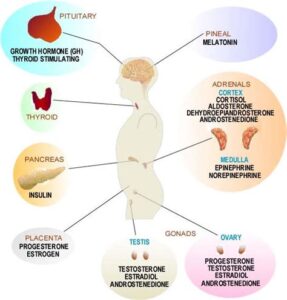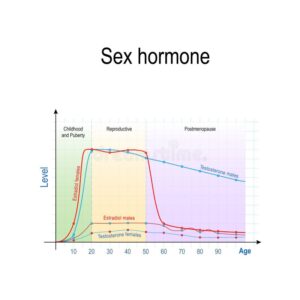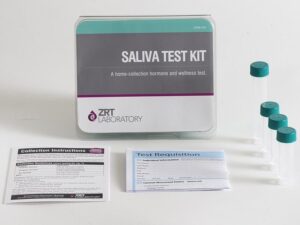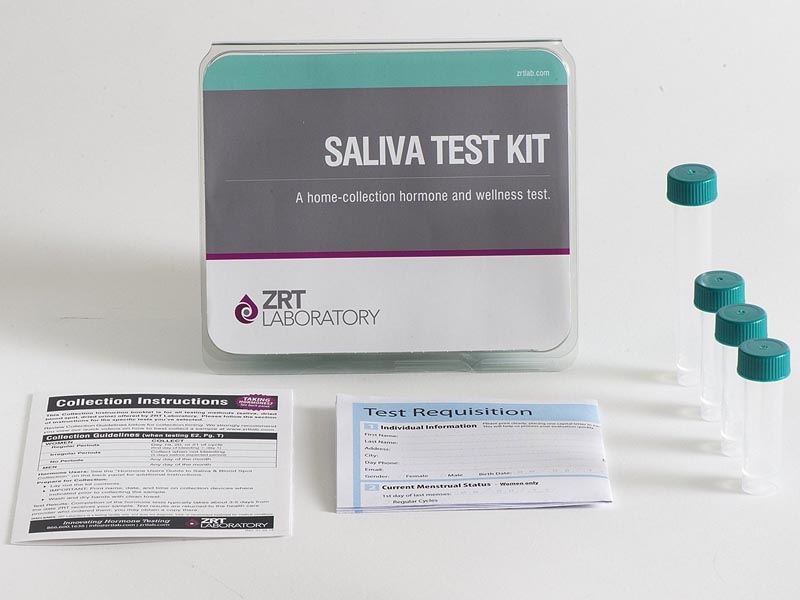What are Hormones?
Hormones bring important messages to every cell of your body. They travel in your bloodstream where they bind to carrier proteins and are slowly released into tissues throughout the body. They work slowly, over time, and affect many different processes, including:
- Growth and development
- Metabolism – how your body gets energy from the foods you eat
- Sexual function
- Reproduction
- Mood
Endocrine glands, which are special groups of cells, make hormones. The major endocrine glands are the pituitary, pineal, thymus, thyroid, adrenal glands, and pancreas. In addition, men produce hormones in their testes and women produce them in their ovaries.

Hormones are powerful. It takes only a tiny amount to cause big changes in cells or even your whole body. Evidence shows that hormonal imbalances are the root cause of many chronic health issues (breast cancer, strokes, heart attacks etc.). Laboratory tests can measure the hormone levels in your blood, urine, or saliva. The only way to know if hormones are in balance in the body is to test them. This article will focus on saliva hormone testing.
3 Questions That Need Answers for Hormone Balance
- Are my symptoms caused by a hormone imbalance?
- Which hormones do I need to regain hormone balance?
- How do I use hormones for optimal health and balance?
Estrogen/Progesterone/Testosterone are the 3 hormones most often out of balance in women. Progesterone helps the female body regulate the menstrual cycle, is essential for creating and maintaining a pregnancy, it balances the effects of estrogen and most other hormones are made from it. Estrogen is the hormone that makes you female (creates breasts, menstrual periods, soft skin and a higher pitched voice). Testosterone is the male hormone and contributes to sex drive and helps build bone (women also make it in smaller amounts).

DHEA (dehydroepiandrosterone) is a precursor to testosterone, estrogen and progesterone meaning that these hormones are made from it. DHEA is made primarily in the adrenal glands and is essential for protein building and repair. DHEA levels decline dramatically as we age, making it a primary biomarker of aging.
Saliva Hormone Testing
Saliva testing is a non-invasive collection method where patients collect their saliva in plastic tubes in order to measure hormones like cortisol, estrogen, progesterone, and testosterone. This non-invasive saliva collection is ideal for patients because it allows them to collect their sample in the privacy of their home or office.
Why Do We Test Hormones in Saliva?
 The reason we test hormones in saliva, is because they are representative of the bioavailability or free concentration of a particular hormone. Steroid hormones (testosterone, estradiol and progesterone) are created from cholesterol that freely diffuse out of the bloodstream into the salivary glands and move into the saliva. When a hormone is produced by the different glands of the body (testes, ovaries, adrenals etc.) they are released into the bloodstream and most (95-99%) are bound to carrier proteins. Estradiol and testosterone become bound to sex hormone binding globulin (SHBG), so only 2% of the hormone is bioavailable (free) to move into tissue. Therefore, measuring hormones in saliva is measuring the bioavailable fragment of hormones (the amount that is available to target tissues) and better relates to specific symptoms of excess or deficiency. ZRT measures hormones from a single morning sample, which represents the peak of daily hormone production – the optimal time to measure.
The reason we test hormones in saliva, is because they are representative of the bioavailability or free concentration of a particular hormone. Steroid hormones (testosterone, estradiol and progesterone) are created from cholesterol that freely diffuse out of the bloodstream into the salivary glands and move into the saliva. When a hormone is produced by the different glands of the body (testes, ovaries, adrenals etc.) they are released into the bloodstream and most (95-99%) are bound to carrier proteins. Estradiol and testosterone become bound to sex hormone binding globulin (SHBG), so only 2% of the hormone is bioavailable (free) to move into tissue. Therefore, measuring hormones in saliva is measuring the bioavailable fragment of hormones (the amount that is available to target tissues) and better relates to specific symptoms of excess or deficiency. ZRT measures hormones from a single morning sample, which represents the peak of daily hormone production – the optimal time to measure.
Female Hormone Cycles That Can Lead to Imbalance
Premenopause refers to the years between ages 30-50 when women’s hormones begin to fluctuate and cause symptoms such as PMS, weight gain, endometriosis, fibroids, infertility and tender breasts.
Perimenopause refers to the years before menopause when many women’s hormones are really fluctuating, causing even greater weight gain, irregular periods, heavy bleeding, hot flashes, night sweats, insomnia, mood swings, thinning skin, vaginal dryness, loss of sex drive, fatigue and memory loss.
Menopause is official when you haven’t had a menstrual period for 1 entire year. 95% of women reach menopause between the ages of 44-55. The average age of menopause is 50.
Symptoms of Possible Hormone Imbalance
To find out how your symptoms correlate to a possible hormone deficiency take the Hormone Balance Test. If you have 2 or more of the symptoms in a category, then there’s a good chance that you have that hormone imbalance (you can have more than 1 type of hormonal imbalance). Candidates for hormone testing include women who are struggling with:
Progesterone Deficiency: (most common hormone imbalance)
- PMS
- insomnia
- early miscarriage
- painful and/or lumpy brests
- cyclical headaches
- anxiety
- infertility
Estrogen Deficiency: (most common in menopausal women, especially if slim)
- vaginal dryness
- night sweats
- painful intercourse
- memory problems
- bladder infections
- lethargic depression
- hot flashes
Excess Estrogen: (most common issue with women taking synthetic hormones for menopause)
- puffiness and bloating
- cervical dysplasia
- rapid weight gain
- breast tenderness
- mood swings
- heavy bleeding
- anxious depression
- migraines
- insomnia
- foggy thinking
- red flush on face
- gallbladder problems
- weepiness
Estrogen Dominance: (caused by lack of progesterone to balance the effects of estrogen – progesterone to estrogen ratio should be 200:1)
- PMS
- insomnia
- early miscarriage
- painful and/or lumpy brests
- cyclical headaches
- anxiety
- infertility
- puffiness and bloating
- cervical dysplasia
- rapid weight gain
- breast tenderness
- mood swings
- heavy bleeding
- anxious depression
- migraines
- insomnia
- foggy thinking
- red flush on face
- gallbladder problems
- weepiness
Excess Androgens (male hormones – caused by too much sugar and carbs in a woman’s diet)
- acne
- polycystic ovary syndrome (PCOS)
- excessive hair on the face/arms
- hypoglycemia and/or unstable blood sugar
- thinning hair on head
- infertility
- ovarian cysts
- mid-cycle pain
Cortisol Deficiency: (caused by chronic stress fatiguing the adrenals)
- debilitating fatigue
- unstable blood sugar
- foggy thinking
- low blood sugar
- thin and/or dry skin
- intolerance to exercise
- brown spots on face
When to Test Hormones?
- Pre-menopausal women should collect saliva on days 19-21 of their cycle. Women with irregular cycles should collect five days before they think their period will start.
- Post-menopausal and non-cycling women, men and children can collect any day of the month.
Sample ZRT Saliva Testing Report
Hormone Replacement Therapy
Hormones are called natural or bioidentical if they are exact duplicates of what your body makes. Synthetic hormones are not natural to your body. Pharmaceutical companies purposely make them different from natural hormones so they can be patented for profit (Provera, Aygestin, Megace, Premarin, PremPro). Natural substances cannot be patented and therefore tend to be less expensive. If you are considering hormone replacement therapy, it is prudent to only do so if you have identified a deficit with testing AND you have obvious symptoms that correlate to that particular hormone deficiency. To find out how your symptoms correlate to a possible hormone deficiency take the Hormone Balance Test. Make sure to work with a physician that will prescribe hormones in doses that create hormone balance (as identified by retesting).
Note on xenoestrogens: we are exposed daily to these through plastics and pesticides; off-gassing from particle board and carpets and consumption of synthetic hormones in meat and dairy products. As a result, we carry an unnatural burden of foreign estrogens (progesterone supplementation may help protect us from their effects).

Other Factors in Hormone Imbalance
Poor diet, including excess sugar and carbohydrates; lack of healthy fats (such as omega-3 fatty acids); lack of fiber and nutrients found in natural whole foods, and alcohol consumption.
Toxin exposure, such as with pesticides and nail polish.
Stress depletes the adrenal glands and create imbalances among all hormones.
Lifestyle issues such as lack of exercise, lack of sleep, cigarette smoking and using birth control pills during the early teens.
Combining hormone balancing with correction of environmental and lifestyle factors offers the best opportunity for reducing symptoms of hormone imbalance.
Thyroid Deficiency & Hormone Balance
Thyroid hormone levels are closely related to sex hormone balance. For example, excess estrogen can block thyroid function. If your hormone imbalance symptoms have largely resolved, yet you have cold hands and feet, a lack of energy, brittle nails and dry hair, you may be experiencing a thyroid deficiency. In this case, you will need blood work to evaluate your thyroid levels. For more information, please see the Thyroid section of Interpreting Your Blood Lab Tests.
References:
Lee, John R. and Hopkins, V. Hormone Balance Made Simple. 2003.



